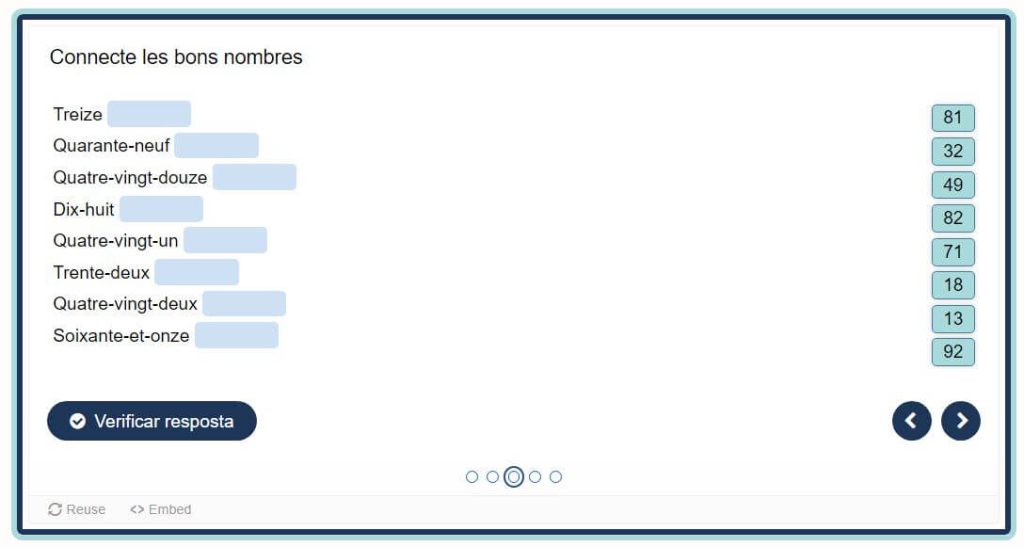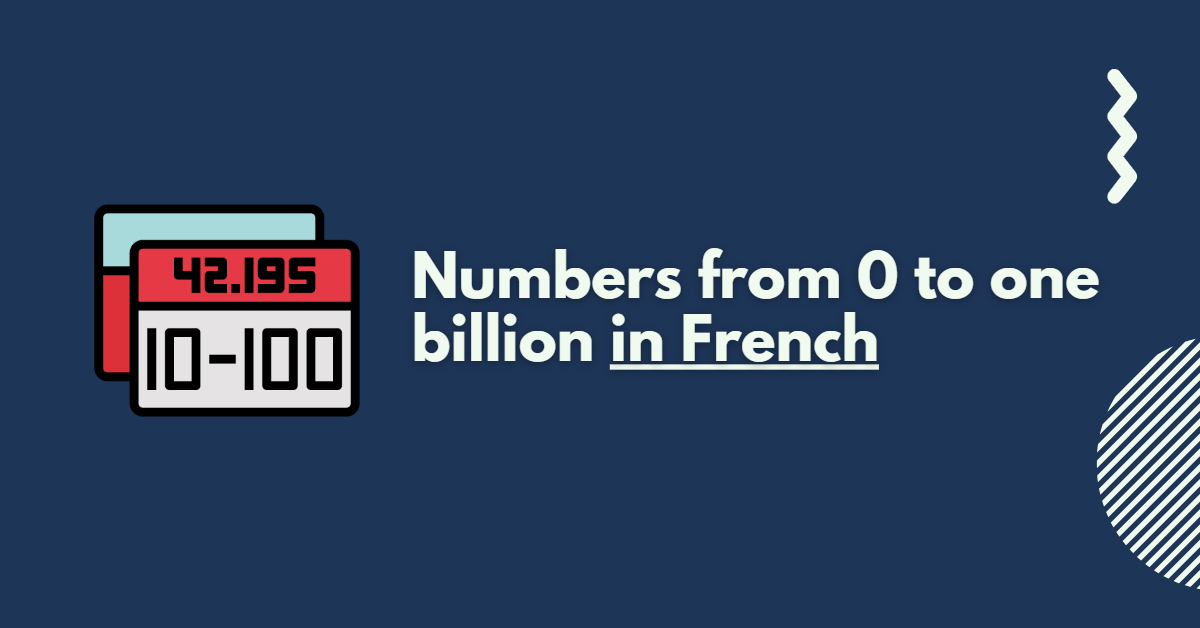Numbers in French are often seen as difficult, this is not totally wrong, but it is not that difficult.
The mistake that many students make is to try to learn them all at once, from 0 to 1,000,000. A good way to get disgusted with French! If you learn the numbers in several steps, as we do in our 601 course, it will be much more enjoyable and effective!
Here you will find a reminder and exercises that summarize everything.
Numbers 1 to 10
- Un/Une
- Deux
- Trois
- Quatre
- Cinq
- Six
- Sept
- Huit
- Neuf
- Dix
Repeat the numbers
Numbers 11 to 20
In the last lesson we saw numbers from 0 to 10, today we saw numbers from 11 to 20.
- Onze
- Douze
- Treize
- Quartoze
- Fifteen
- Seize
- Dix-sept
- Dix-huit
- Dix-neuf
- Vingt
Repeat the numbers
And now you remember the time?
Les nombres de 21 à 69
We continue with numbers, and get into the hard part of the numbers that “make up” in French (a real mathematicians’ country!), it is strange at first, but there is a certain logic to it.
To learn numbers quickly, we advise that you always start by learning the tens and then understand the structure. You already know “dix” (10) and “vingt” (20).
- 30 : trente
- 40 : quarante
- 50 : cinquante
- 60 : soixante
Voilà quelques exemples :
| 21 | vingt-et-un | twenty one |
| 22 | vingt-deux | twenty-two |
| 23 | vingt-trois | twenty-three |
| 24 | vingt-quatre | twenty-four |
| 25 | vingt-cinq | twenty-five |
| 26 | vingt-six | twenty-six |
| 27 | vingt-sept | twenty-seven |
| 28 | vingt-huit | twenty-eight |
| 29 | vingt-neuf | twenty-nine |
| 30 | trente | thirty |
| 50 | cinquante | fifty |
| 51 | cinquante-et-un | fifty-one |
| 52 | cinquante-deux | fifty-two |
| 53 | cinquante-trois | fifty-three |
| 54 | cinquante-quatre | fifty-four |
| 55 | cinquante-cinq | fifty-five |
| 56 | cinquante-six | fifty-six |
| 57 | cinquante-sept | fifty-seven |
| 58 | cinquante-huit | fifty-eight |
| 59 | cinquante-neuf | fifty-nine |
| 60 | soixante | sixty |
| 61 | soixante-et-un | sixty-one |
Names from 70 to 100
Just keep in mind and memorize the tens, then it is always the same structure.
Do you want to know how to conjugate 90% of French verbs? Download our PDF!
Les nombres (les dizaines)
| 10 | Dix |
| 20 | Vingt |
| 30 | Trente |
| 40 | Quarante |
| 50 | Cinquante |
| 60 | Soixante |
| 70 | Soixante-dix |
| 80 | Quatre-vingts |
| 90 | Quatre-vingt-dix |
| 100 | Cent |
It is always the same structure until 69:
- 21: Vingt et un
- 22: Vingt-deux
- 31: Trente et un
- 35: Trente-cinq
Then 69:
- 71: Soixante-et-onze = 60 + 11
- 72: Soixante-douze = 60 + 12
- 81: Quatre-vingt-un = 4*20 + 1
- 83: Quatre-vingt-trois = 4*20 + 3
- 91: Quatre-vingt-onze = 4*20 + 11
- 93: Quatre-vingt-treize = 4*20 + 13
Think about the fact that there are no tens after “60” and so we had to deal with the tens that exist before, like seventy = 60 + 10
Tips: In the beginning, don’t focus too much on spelling, but concentrate on pronunciation. Most of the time the French have difficulty understanding the
Les nombres de 100 à 1.000.000.000 !
Now that you have the logic, everything becomes easier for the rest:
- Mille : Mil
- Million : million
- Milliard: billion
The numbers are then composed according to the following logic: the largest before the smallest.
- 1402 : Mille-quatre-cent-deux
- 2500 : deux-mille-cinq-cent s
- 2520 : deux-mille-cinq-cent-vingt
- 5.000.000 : cinq milliards
Un “s” or pas de “s” ?
- On écrit: cent-vingt (120) sans ” s “, car cent et vingt ne sont pas multipliés; trois-cent-quatre-vingt-dix (390) parce que cent et vingt ne terminent pas le nombre; mais deux-mille-sept-cents ans (2 700), car cent est multiplié et en fin de nombre.
- Attention ! As you can see from the examples, “mille” is invariable, but “millions” and “milliards” are not.
It doesn’t matter if you forget the “s” or put an extra “s” if you are not going to participate in a competition any time soon. But we write it down so that you will know this rule.
Now, practice!
Register for free to do the exercises and access +1000 exercises and videos in French.





